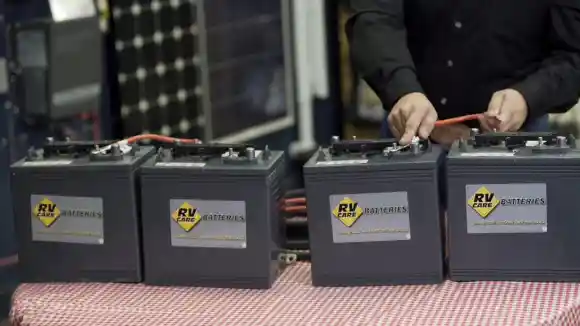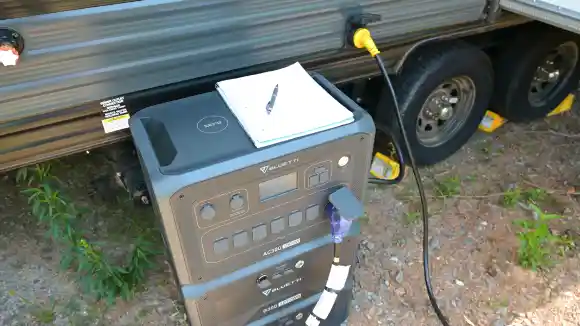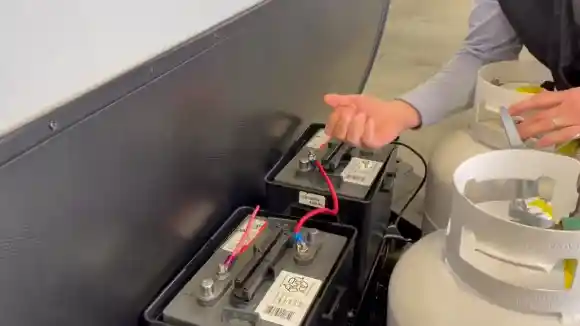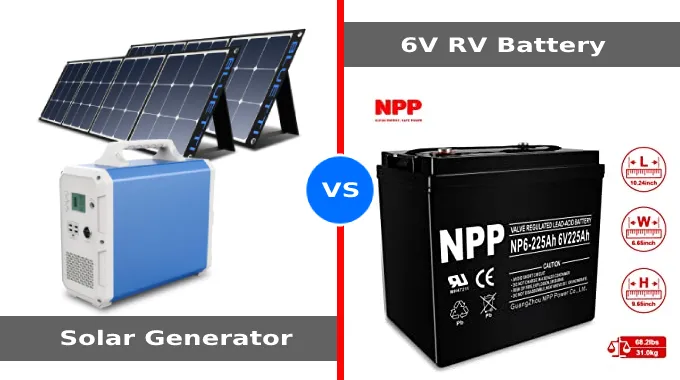Last Updated on April 19, 2023
Are you planning your next camping trip and need a reliable power source? If so, you may wonder whether to use a solar generator or a 6V RV battery. Although both provide electricity to run your RV components, the most significant difference is between their power sources.
A solar generator generates power from the sun using solar panels, while a 6V RV battery generates power from a chemical reaction between its internal components. There are also more differences between them and they have different pros and cons.
Therefore, choosing the right one for your needs can make all the difference. Let’s compare solar generators and 6V RV batteries today so you can make an informed choice and enjoy your time in nature.
Solar Generator VS 6V RV Battery: 8 Differences

Solar generators and 6V RV batteries are both popular options for RV enthusiasts and those who need reliable off-grid power. While both have their own benefits, there are significant differences between the two that you should be aware of to make an informed decision.
Power Source
Solar generators rely on the sun’s power to generate electricity, making them an environmentally friendly and clean energy option. They use photovoltaic (PV) panels to convert sunlight into usable energy, which can then be stored in batteries for later use.
Meanwhile, 6V RV batteries are lead-acid batteries that store energy through a chemical reaction. They can be recharged using solar panels, chargers, or generators.
The main advantage of 6V RV batteries is that they can be recharged multiple times, whereas solar generators are limited by the amount of sunlight available.
Portability
In terms of portability, solar generators are designed to be lightweight and compact, making them easy to carry around. Their PV panels can be folded or removed, and the battery can be easily detached for transport.They’re great for camping, events outside, and emergencies.
6V RV batteries are bulkier, making them less suitable for portability. They are often used to power larger RVs or as a home backup power source.
Charging
Solar generators can be charged using solar panels, making them an ideal option for off-grid use. However, they are limited by sunlight and may need a backup power source in cloudy weather.
6V RV batteries require a charger or generator to recharge, making them less ideal for off-grid use. But they can be charged using a solar panel, making them a better option for extended camping trips.
Capacity

Solar generators are available in a wide range of capacities, depending on the size of the battery and the number of PV panels. They can power small electronics, such as smartphones or laptops, and larger appliances, such as refrigerators or power tools.
6V RV batteries also come in different capacities, but they are typically used to power larger appliances or multiple devices simultaneously.
Eco-friendliness
Solar generators are undeniably more eco-friendly than 6V RV batteries. It is a renewable energy source that produces no emissions or harmful gasses to the environment. Also, solar generators have built-in rechargeable batteries, enabling you to store excess energy for later use.
In contrast, 6V RV batteries contain harmful chemicals and require proper disposal after use. They also emit gasses that can harm the environment and cause harm to human health.
Ease of use
While both solar generators and 6V RV batteries are relatively easy to use, solar generators have the upper hand in this category. Solar generators are lightweight and portable, making them ideal for outdoor use. They are also user-friendly and require minimal maintenance.
Alternatively, 6V RV batteries are heavier and bulkier, making them less convenient. They also require regular maintenance, which can be time-consuming and costly.
Availability
Regarding availability, 6V RV batteries have a slight advantage over solar generators. 6V RV batteries can be found in most automotive and RV stores, making them readily available.
In contrast, solar generators may be challenging to find and may require special ordering or buying online. However, with the rising popularity of solar-powered products, solar generators are becoming more widely available.
Maintenance
As mentioned earlier, 6V RV batteries require regular maintenance to prolong their lifespan, while solar generators require minimal maintenance. 6V RV batteries must be charged regularly, and the water levels in the batteries must be topped up frequently.
In contrast, solar generators only require occasional cleaning to remove debris and dust buildup.
How Does a Solar Generator Work on an RV?

A solar generator is a device that converts sunlight into electrical energy. It consists of solar panels, a battery, and an inverter.
Solar panels absorb sunlight and convert it into DC electricity, then the battery stores it. The inverter then converts the DC electricity into AC electricity that can be used to power various devices.
The process of how a solar generator works is quite simple. When the sun shines on the solar panels, they generate an electric current that flows through the wires and charges the battery.
RV batteries store this energy until it is needed. When you need to use your devices, you simply plug them into the inverter, which converts the stored DC electricity into usable AC electricity.
How Does a 6V RV Battery Work?
A 6V RV battery is a rechargeable battery designed to power recreational vehicles. It works by storing electrical energy as chemical energy within the battery cells.
The basic principle behind how a 6V RV battery works involves a chemical reaction that occurs between two electrodes and an electrolyte solution.
The positive electrode, or cathode, is made of lead dioxide (PbO2), while the negative electrode, or anode, is made of pure lead (Pb). The electrolyte solution typically contains sulfuric acid (H2SO4) mixed with water.
When the battery is charged, electrons are forced from the cathode to the anode through an external circuit. This causes a buildup of a negative charge at the anode and a positive charge at the cathode.
When the battery is discharged, electrons flow from the anode to the cathode through the external circuit, creating a flow of electrical current.
Advantages and Disadvantages of Solar Generators

Solar generators are an excellent option for those who want a reliable and eco-friendly power supply. However, they have advantages and disadvantages.
Pros of Using a Solar Generator
- Eco-friendly and renewable energy source: Solar generators are becoming increasingly popular due to their eco-friendly and renewable sources. They use the sun’s power to generate electricity, making them suitable for those trying to cut down on their carbon footprint.
- Portable and Easy to Use: Another advantage of using a solar generator is that it is portable and easy to use. You can take it on camping trips or as a backup power supply during emergencies. Also, they do not require fuel, so you don’t have to worry about running out of gas or propane.
- Efficient and dependable power supply: In terms of efficiency and dependability, solar generators are highly efficient as they convert sunlight into electricity directly without any intermediate steps.
They also provide a dependable power supply if there is enough sunlight to charge the generator’s batteries.
Cons of Using a Solar Generator
- One main con of using a solar generator are the high initial cost. Compared to 6V RV batteries, solar generators can be quite expensive to purchase upfront.
- Solar generators are also efficient and dependable power sources, but their power output is limited. This means that a solar generator may not be the best choice for you if you have high energy requirements.
Advantages and Disadvantages of 6V RV Batteries
6V RV batteries are a popular choice for those who need a reliable power source for their recreational vehicles. These batteries are affordable and can provide long-lasting power with proper maintenance.
However, they do have some advantages and disadvantages that should be considered before making a final decision.
Pros of Using a 6V RV Battery
- Affordability: One of the main advantages of using a 6V RV battery is its affordability compared to solar generators. While solar generators can be expensive, 6V RV batteries are relatively cheap and widely available. This makes them an excellent choice for budget-conscious consumers.
- Long-Lasting Power Supply: Another benefit of 6V RV batteries is their long-lasting power supply with proper maintenance. These batteries are designed to provide consistent energy over extended periods, making them ideal for prolonged use in remote locations.
Cons of Using a 6V RV Battery
- One major disadvantage of 6V RV batteries is their weight and bulkiness. These batteries can be quite heavy and difficult to transport, which can be a hassle for those who frequently move their RVs from place to place.
- Another downside to using 6V RV batteries is that they require frequent recharging. If you plan on using your RV for an extended period without access to an electrical hookup, you must bring additional batteries or find a way to recharge them regularly.
Solar Generator vs 6V RV Battery: Which One to Choose?

When choosing between a 6V RV battery or solar generator, you must consider several factors, such as your power requirements, budget, portability needs, and environmental impact concerns.
For instance, a solar generator may be the best option if you need a reliable and eco-friendly power source for camping or emergencies. But if you have a limited budget and don’t mind the weight of the battery, then a 6V RV battery may be the way to go.
Choosing between Solar Generators and 6V RV Batteries: Factors to Consider
When deciding between a solar generator and a 6V RV battery, there are several factors to consider.
Power Requirements:
A solar generator may be the better option if you have high power requirements, such as running multiple appliances or charging larger electronic devices.
They can provide a reliable and efficient power supply for extended periods, especially if equipped with larger battery capacities and solar panels. But, it’s important to note that the initial cost of a solar generator can be quite high.
On the other hand, if you have lower power requirements and prefer a more affordable option, then a 6V RV battery may be sufficient. While they may not provide as much power as a solar generator, 6V RV batteries can still offer long-lasting power with proper maintenance.
Budget Considerations
Solar generators have a higher initial cost than 6V RV batteries. This is because they require more advanced technology and materials to produce electricity from sunlight.
Conversely, 6V RV batteries are generally more affordable than solar generators. They also have a longer lifespan with proper maintenance and can provide a reliable power supply for your RV. However, 6V RV batteries must be recharged frequently and may require replacement after several years.
Portability Needs
Generators made from solar power are portable and easy to use. They typically come in compact sizes that fit easily in your car or backpack. They don’t require fuel or additional equipment to operate, making them a convenient option for camping or hiking.
Meanwhile, 6V RV batteries are heavy and bulky, making them difficult to transport. They also require frequent recharging when in use, which can be inconvenient if you’re on the go.
Environmental Impact Concerns
Solar generators are an eco-friendly and renewable energy source that does not emit harmful pollutants into the atmosphere. They use solar panels to convert sunlight into electricity, making them an excellent choice for those who want to reduce their carbon footprint.
Conversely, 6V RV batteries require frequent recharging, which can lead to increased energy consumption and pollution. Also, these batteries contain toxic chemicals that can harm the environment if not disposed of properly.
A solar generator may be ideal if you need a lot of power. Solar generators can provide more power than 6V RV batteries and run larger appliances such as refrigerators or air conditioners.
Are 6-Volt Batteries Better For Rv Solar Systems?

Regarding RV solar systems, 6-volt batteries have proven to be an excellent choice over their 12-volt counterparts. This is primarily due to the greater space per cell that 6-volt batteries provide, allowing for thicker plates that have the potential to last longer than those found in 12-volt batteries.
Also, 6-volt batteries tend to have a higher capacity, meaning they can store more energy and deliver it for longer. This makes them especially well-suited for larger RVs or those that require a lot of power regularly.
How long do 6-volt batteries last in an RV?
Generally, a well-maintained 6-volt battery can last 6 years or more in an RV. This assumes the battery is charged and discharged properly, kept at the appropriate temperature, and not subjected to extreme conditions such as excessive heat or cold.
Of course, many things can impact the lifespan of a battery, from the quality of the components used to make it to the amount of stress it is subjected to daily. This is why you must invest in a high-quality battery from a reputable manufacturer and follow all instructions for use and maintenance care.
Renewable Energy or Reliable Maintenance: Choose Wisely to Power Your RV
Choosing between a solar generator and a 6V RV battery depends on several factors. Solar generators are a sustainable and reusable energy source that provides an efficient and dependable power supply. 6V RV batteries are affordable and provide a stable power supply with proper maintenance.
When considering which option best suits your needs, it is essential to consider factors such as your specific usage scenario’s power requirements, budget considerations, portability needs, and environmental impact concerns.
In the end, the choice between the solar generator and 6V RV battery comes down to personal preferences based on these factors. Finally, you must choose the one that best meets your needs while considering its pros and cons.


